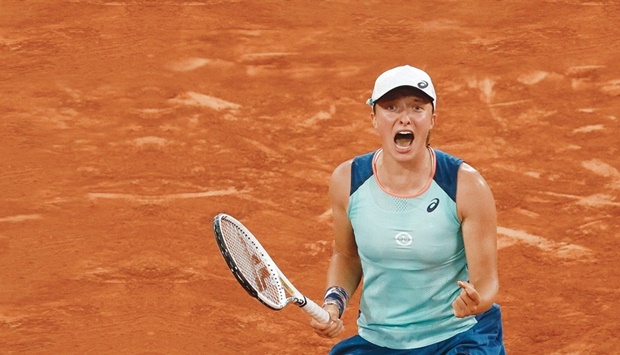Iga Swiatek said equalling the longest unbeaten run by a female player in the 21st century made winning her second French Open title yesterday even more “special”.
The world number one drew level with Venus Williams’ run of 35 straight wins in 2000 by cruising past teenager Coco Gauff 6-3, 6-1 in the final at Roland Garros. Swiatek’s victory also took her past Serena Williams’ longest unbeaten streak of 34 matches.
“I think honestly, it may seem pretty weird, but having that 35th win and kind of doing something more than Serena did, it’s something special,” said the 21-year-old.
“Because I always wanted to... have some kind of a record. In tennis it’s pretty hard after Serena’s career.
“So that really hit me, you know. Obviously winning a Grand Slam too, but this one was pretty special because I felt like I’ve done something that nobody has ever done, and maybe it’s gonna be even more.”
Swiatek has now won six consecutive tournaments this season, including four WTA 1,000 titles and one major. She took the world-number-one ranking vacated by the retired Ashleigh Barty and has continued to beat all-comers since. The Pole won the Indian Wells-Miami double to show her hard-court prowess, having also lifted the title in Doha, and has now dominated on clay by emerging victorious in Stuttgart, Rome and Paris.
But to extend her unbeaten run, she will have to improve her career grass-court record of four wins and four losses in main-draw matches.
Last year, Swiatek showed signs of improvement on the surface by reaching the fourth round at Wimbledon and says she has nothing to lose at the All England Club later this month.
“My coach (Tomasz Wiktorowski) believes I can win more matches on grass,” said Swiatek, who has reached the second week at seven consecutive Grand Slam tournaments.
“I don’t know about that yet. But I would like to add like one or two.
“But honestly, grass is always tricky. I actually like the part that I have no expectations there. It’s something kind of refreshing.”
Swiatek has also now won her last nine finals, with the only WTA final defeat in her career coming in a low-key event in Lugano when she was just 17.
“I try to treat it as any other match, which is pretty hard and kind of not possible, because there are always going to be like bigger amount of stress,” she added.
“I guess I’m kind of accepting that a little bit more and just, I try to lean on the strengths. I’m also aware that my opponents are also going to be stressed. So I try to not panic and just be less stressed than they are.”
Swiatek now boasts an impressive 21-2 win-loss record at Roland Garros, although she has a long way to go to match her idol Rafael Nadal’s 111-3.
“He had many more chances to lose, so I think his stat is much, much better,” she said of the 13-time champion, who faces Casper Ruud in Sunday’s men’s final.
Swiatek title is “just the beginning of the journey” for the world number one, her coach Tomasz Wiktorowski said yesterday. “This is just the beginning of this journey, we have much more to do and every single tournament just bring us new information,” said Wiktorowski. “We will try to develop other tools. To be honest, we do not count the victories. We live day by day.”
Wiktorowski described the excitement of Saturday’s win as “10 out of 10”, highlighting his player’s strengths.
“We were all very very proud. From the very beginning we all decided to focus on her strengths, she’s a dynamite on the court. So when you are dynamite on court, you can’t play defensively.”
Swiatek displayed a fighting spirit since her early days hammering balls on Warsaw’s tennis courts. “She was a little kid who really wanted to learn how to play as quickly as possible, and once she did, what mattered most to her was winning,” said Artur Szostaczko, her first coach.
“She was a fighter... I knew that if it went to a super tiebreak, there was no need to worry - Iga wouldn’t crack under the pressure,” the 51-year-old told AFP.
Szostaczko still teaches on the clay court where the Polish phenomenon first picked up a racket and tried her hand at hitting against a concrete wall during her older sister’s lesson.
“Left, right, the whole time she was running about having a ball,” he said.
“Normally a small child has trouble hitting even one or two balls but she could keep it going for dozens of shots,” added the coach.

Poland’s Iga Swiatek celebrates winning the women’s singles final match against Cori Gauff of the US. (REUTERS)
